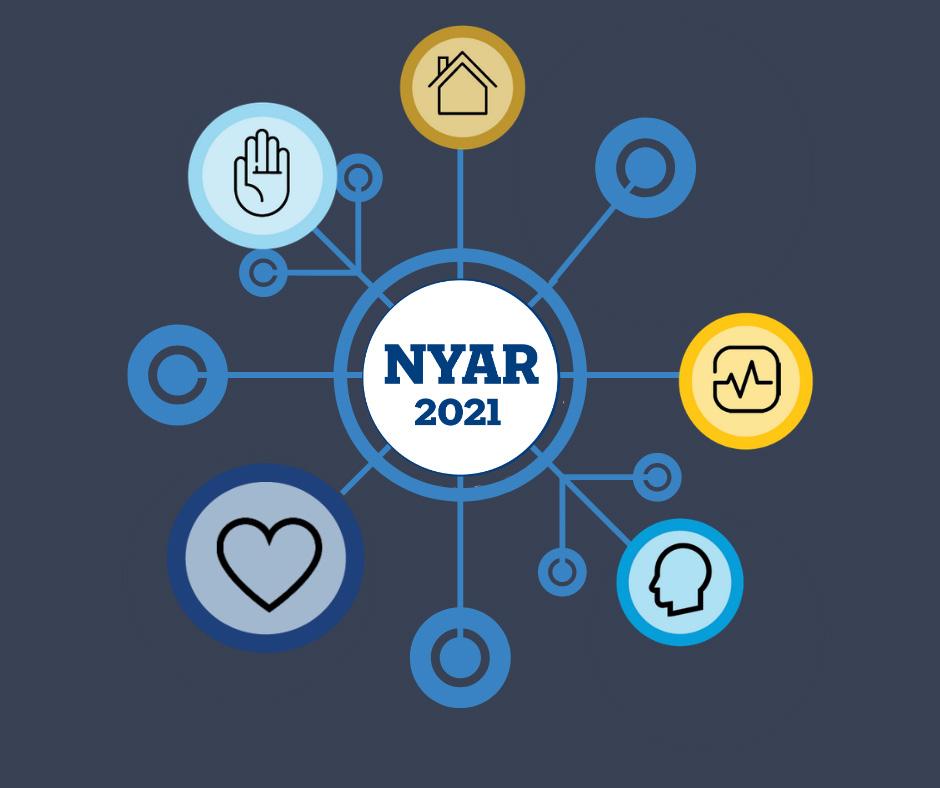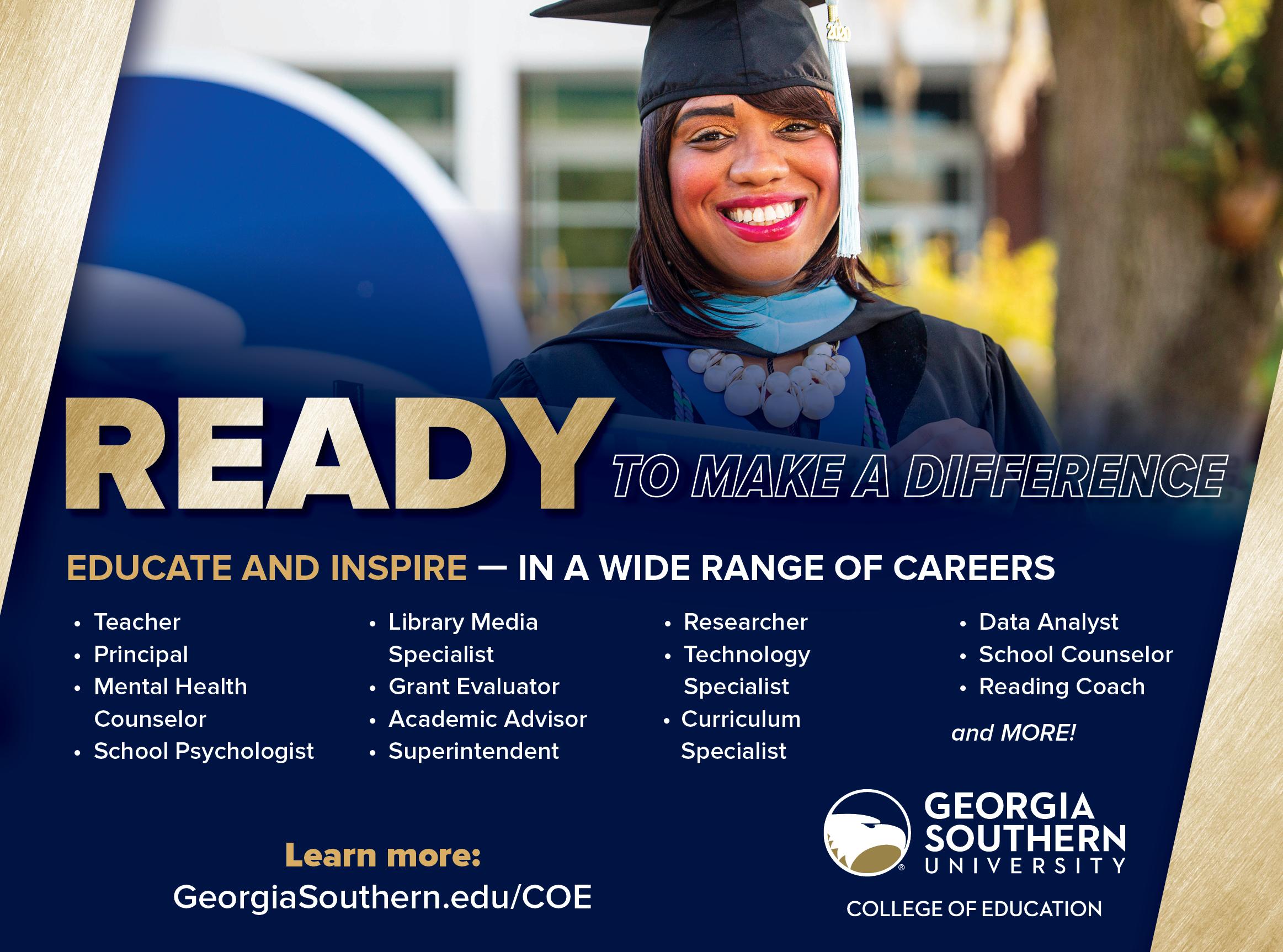
5 minute read
Session Five
The I’s Don’t Have It Because My Kids Do!
Charlie Frazier, PhD, Claxton Middle School, Claxton, GA Tanita McDowell, EdS, Claxton Middle School, Claxton, GA The professional development program, “The I’s don’t have it because my kids do!”, is an instructional model whereby practical principles of transforming culture constantly evolve and are adapted according to the needs of the students being served. The R & S Model presents a practical opportunity for educators to develop and build meaningful relationships with students while fostering a self-motivated learning environment.
11:05 - 11:25 a.m. Session Change • Exhibitor Appointments
11:25 a.m. - 12:25 p.m. Session 5 Breakouts
At-Risk Professionals Working with At-Risk Youth: Discovering Your Sweet Spot
Joe Johnson, PhD, University of Denver, Pontiac, MI Working with At-Risk youth can be challenging, frustrating, and very disappointing to professionals who are working outside of their “sweet spot.” Many professionals fall victim to a belief that “having a heart” for the At-Risk population is enough to create impact. This session is designed for professionals that are burned or burning out, searching for their “sweet spot” within the At-Risk youth career field, or ready to discover and leverage their skills and strengths for traditional or non-traditional opportunities.
Humanity in the Black
Marion Pugh, EdD, Georgia Southern University/Manhood Mindset, Statesboro, GA What does the Eugenics Movement have to do with education? Are specific groups not considered human beings in law? Participants will be challenged to investigate the various abstractions, barriers and pipelines to prison (risk-producing machines) that affect the learning environment and beyond. Participants will discuss and examine the historical use of categories and labels that were intended to injure and defraud specific groups. The “legal” descriptions of specific groups have been intentionally used in the school system to put certain youth at risk. Once these risk-producing abstractions are identified, participants will be able to understand the purpose of the categories and will be able to effectively create a personal code of conduct that will counter the assault on the humanity of students, parents, teachers and administrators.
Exploring Life Satisfaction with the kid-grit Holistic Wellness Wheel
Julia Gabor, MEd, kid-grit, Redondo Beach, CA Jeffrey Jordan, BA, kid-grit, Bayone, NJ If there was ever a time for self-care–it is now! This interactive session will help you examine your own health and wellness in order to find balance and energy to support youth. Using the kid-grit Holistic Wellness WheelTM, the presenters will examine the CASEL framework and five additional strategies that will support you in and out of the workplace. You will walk away with an action plan that will support you and be used with your students.
Foundations of Restorative Discipline: A Relational Approach to Building Community and Addressing Student Behavior - Part 2
Summer Pannell, PhD, CAA, Stephen F. Austin State University, Nacogdoches, TX Juliann McBrayer, EdD, Georgia Southern University, Statesboro, GA Restorative Discipline (RD) is a community process that seeks to address harm, needs, and obligations along with bringing people together to support one another. RD is a values-driven approach built on principles of interrelationships, respectful dialogue, and building relationships. Elements of RD create a safe space with non-hierarchical influences which allow people to speak without interruption, encourage respectful listening and speaking, and provide the space for reflection. In part two of this two-part series, this workshop will provide a fundamental knowledge base for RD and provide opportunities for participants to engage in RD practices.
The Minority Report
Hotep, MBA, Hustle University, DeKalb, GA Anxiety, fear and depression are at an all-time high due to the Covid-19 pandemic. Add the current state of racial and political unrest in our country and it is understandable why so many people are suffering from the various forms of crisis fatigue. Despite inequities in low-income and minority communities, some schools are thriving. The stakeholders demonstrate resilience, grit and positivity. By summarizing an incredible amount of qualitative and quantitative data on what works in schools (and what doesn’t), this presentation shares 10 years of real-world research from a unique African-American perspective.
No Matter Where We Started From: Setting High Expectations and Providing Strategic Supports for Our Highest-Risk Youth and Families
Marina V. Gillmore, EdD, The Cambio Group, Redlands, CA Bettye Blaize, The Cambio Group, Baltimore, MD According to the Annie E. Casey Foundation, “African American youth are nearly five times as likely to be confined as their white peers. Latino and American Indian youth are between two and three times as likely to be confined. The disparities in youth confinement rates reflect a system that treats youth of color, particularly African Americans and Latinos, more punitively than similar white youth.” Research also supports the need for more comprehensive, holistic, and long-range programs to ensure that youth who are at high-risk of incarceration and who re-enter schools and communities after incarceration are able to be successful not only academically, but also socially and emotionally. This interactive workshop will take a critically reflective look at this core need and will address the question of how we can collectively engage multiple stakeholders, including families and community members, around holistic and comprehensive practices and programs serving high-risk youth at risk of and/or currently incarcerated. Using foundational principles from the fields of equity pedagogy, restorative justice and social-emotional learning, this workshop will particularly focus on strategies to meet the needs of some of our most disenfranchised, underserved, and at-risk youth.
A Holistic Approach to Positive Youth Development for Youth-At-Risk: Utilizing Land Grant University Resources
Jazmin Thomas, MPA, City of Perry, Perry, GA Crystal Perry, PhD, University of Georgia, Americus, GA Phillip Petway, MPH, Fort Valley State University, Fort Valley, GA The presenters will share information on Extension resources from Land Grant Universities that are available to educators. 4-H Youth programs are easily accessible to help meet the needs of youth for positive development. Participants will learn delivery methods of different 4-H programs, the essential elements that drive the purpose of programming, and the benefits of 4-H programming for at-risk youth populations.
Identifying Red Flags and Risk Factors of Child Sex Trafficking among Runaway and Incorrigible Children in South Carolina
Sydney Arsenault, BSW, University of South Carolina, Columbia, SC Sex trafficking is severely oppressing children in South Carolina, in part due to the difficulty in identifying victim and potential victims. This presentation reveals findings of red flags and risk factors identified from the analysis of runaway and incorrigible incident reports collected from local law enforcement agencies in South Carolina. Applications of the findings will be discussed.
Recruitment and Retention of Students with Disabilities in Extracurricular STEM Activities
Karin Fisher, PhD, Georgia Southern University, Statesboro, GA Peggy Shannon-Baker, PhD, Georgia Southern University, Statesboro, GA Kayla Fitzgibbons, BS, Georgia Southern University, Statesboro, GA Kania Greer, EdD, Georgia Southern University, Statesboro, GA Barbara Serianni, PhD, Georgia Southern University, Savannah, GA This presentation will share the research and data the team has collected through two studies on SWD and informal STEM learning environments. The presenters will examine why SWD does not participate in extracurricular STEM activities and what can be done by teachers and club sponsors to mitigate these barriers.




